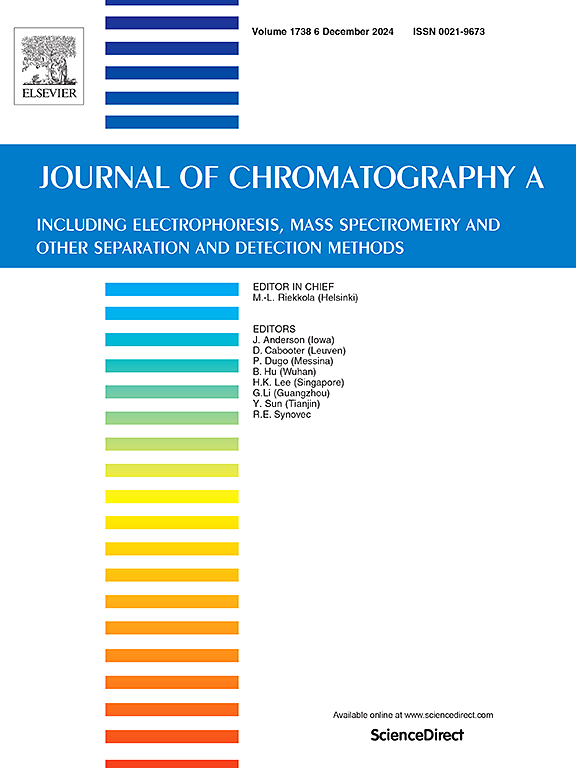磁性氟化介孔金属-有机骨架用于恶劣水环境中全氟烷基羧酸的快速衍生化辅助GC-MS分析。
IF 3.8
2区 化学
Q1 BIOCHEMICAL RESEARCH METHODS
引用次数: 0
摘要
合成了一种新型的磁性介孔氟化金属有机骨架材料(Fe3O4@MIP-206-F),专门用于磁性固相萃取法(MSPE)提取全氟烷基羧酸(PFCAs)。精心设计的Fe3O4@MIP-206-F材料具有适当的孔隙率,开放的Zr金属位点以及有利于吸附过程的官能团(氟和氨基)。该材料独特的结构使其具有特殊的PFCAs提取能力。吸附机制包括酸碱相互作用、疏水相互作用、F-F相互作用、静电相互作用和尺寸互补。通过对关键参数的优化,显著提高了MSPE的萃取效率。当与气相色谱-质谱(GC-MS)相结合时,MSPE提供了快速和高灵敏度的PFCAs分析。该方法线性范围宽(0.050 ~ 50 ng mL-1),检出限低(0.0010 ~ 0.0019 ng mL-1),加样回收率高(86.7% ~ 111%),日内、日间精密度高。这种方法可以准确地量化湖水和地下水样本中的PFCAs,从而精确评估环境污染水平,并支持有针对性的补救措施。本文章由计算机程序翻译,如有差异,请以英文原文为准。
Magnetic fluorinated mesoporous metal-organic frameworks for rapid derivatization-assisted GC–MS analysis of perfluoroalkyl carboxylic acids in harsh water environment
A novel magnetic mesoporous fluorinated metal-organic framework material (Fe3O4@MIP-206-F) has been synthesized specifically for application as an adsorbent for perfluoroalkyl carboxylic acids (PFCAs) extraction by magnetic solid-phase extraction (MSPE). The carefully designed Fe3O4@MIP-206-F material features an appropriate porosity, open metal sites of Zr, and functional groups (fluorine and amino) conducive to the adsorption process. The distinctive architecture of the material endows it with exceptional extraction capabilities for PFCAs. Adsorption mechanisms encompass acid-base interactions, hydrophobic interactions, F-F interactions, electrostatic interactions, and size complementarity. Optimization of key parameters has significantly improved the extraction efficiency of MSPE. When coupled with gas chromatography-mass spectrometry (GC–MS), MSPE offers rapid and highly sensitive analysis of PFCAs. The method demonstrates wide linear range (0.050–50 ng mL−1), low detection limits (0.0010–0.0019 ng mL−1), good recoveries (86.7 % to 111 %), and exceptional intra- and inter-day precision. This approach accurately quantifies PFCAs in lake water and groundwater samples, enabling precise assessment of environmental contamination levels and supporting targeted remediation efforts.
求助全文
通过发布文献求助,成功后即可免费获取论文全文。
去求助
来源期刊

Journal of Chromatography A
化学-分析化学
CiteScore
7.90
自引率
14.60%
发文量
742
审稿时长
45 days
期刊介绍:
The Journal of Chromatography A provides a forum for the publication of original research and critical reviews on all aspects of fundamental and applied separation science. The scope of the journal includes chromatography and related techniques, electromigration techniques (e.g. electrophoresis, electrochromatography), hyphenated and other multi-dimensional techniques, sample preparation, and detection methods such as mass spectrometry. Contributions consist mainly of research papers dealing with the theory of separation methods, instrumental developments and analytical and preparative applications of general interest.
 求助内容:
求助内容: 应助结果提醒方式:
应助结果提醒方式:


